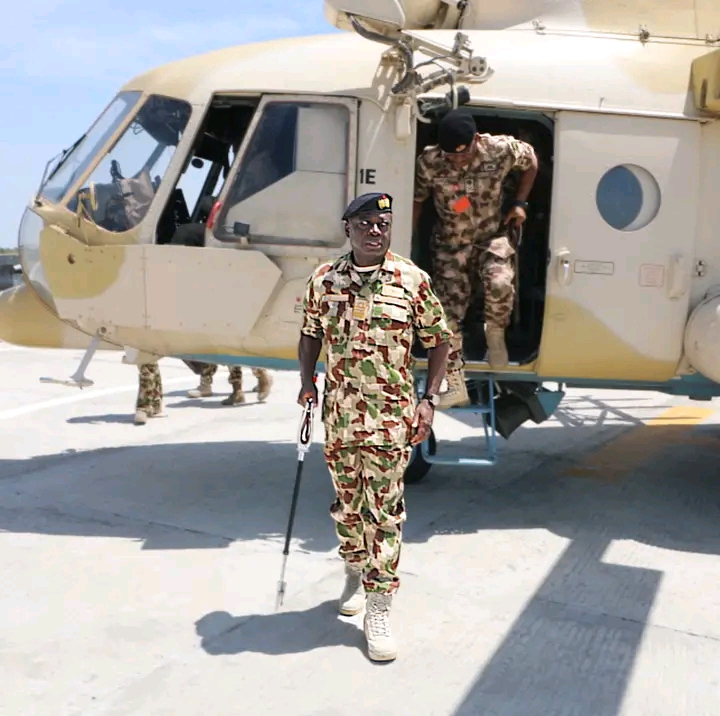By Abdul Lauya
In the aftermath of a brazen midnight assault by Boko Haram terrorists on the Naval Base Lake Chad (NBLC) in Baga, Borno State, Nigeria’s Chief of the Naval Staff (CNS), Vice Admiral Emmanuel Ikechukwu Ogalla, undertook a swift operational visit to the volatile region on Saturday, June 21, 2025. His visit came just days after naval personnel stationed at the base repelled a determined infiltration attempt, further cementing the strategic importance of the Nigerian Navy’s presence in the Lake Chad theatre.
According to security sources, the terrorists launched their attack around 0100 hours on Wednesday, June 18, targeting newly acquired Swamp Buggies provided by the Borno State Government. These specialized amphibious platforms are vital to counterinsurgency operations in the marshy Lake Chad region. Though the attackers were repelled after an intense two-hour firefight, the confrontation caused minor damage to vehicles and left several naval personnel injured.
Vice Admiral Ogalla’s timely visit served as both a morale booster for frontline troops and a strategic affirmation of the Navy’s growing role in counterterrorism efforts inland. In his address to the personnel, he commended their resilience and decisiveness during the attack, emphasizing that such victories, though costly, reflect the Navy’s growing adaptability and combat readiness. He declared a shift in operational posture: “The Navy will take the fight to the terrorists and decimate their hideouts,” he said, signaling a commitment to offensive operations beyond static defense.
This pivot could not be more critical. Though traditionally regarded as an Army-led theatre, the Lake Chad basin, with its difficult terrain, labyrinthine waterways, and porous borders, demands a robust naval presence. The insurgents have exploited the region’s geography for years, using the lake’s islands and swamps as launchpads for raids, smuggling, and regrouping efforts.
The CNS’s visit also included a courtesy call to Borno State Governor Babagana Umara Zulum, who reaffirmed his administration’s partnership with the Armed Forces and praised the Navy’s commitment to securing the lake. Governor Zulum, a strong advocate for military modernization, has been instrumental in supporting joint efforts through logistical provisions, including the procurement of the Swamp Buggies. These vehicles, fortunately untouched in the recent assault, are expected to form the core of a new task force aimed at clearing insurgent routes across the lake.
Vice Admiral Ogalla directed the immediate deployment of this task force, emphasizing that maritime dominance in Lake Chad is non-negotiable. He also visited injured personnel, offering assurances of medical care and support, and was accompanied by top brass including Rear Admirals Olusegun Ferriera, OK Oluwagbire, and Patrick Nwatu. The Theater Commander of Operation HADIN KAI, Major General AE Abubakar, also joined the entourage, reflecting inter-service collaboration at the highest levels.
While the Navy’s ability to repel the latest attack is commendable, it raises critical questions about proactive security measures. Continued reliance on reactionary defense exposes military assets and personnel to avoidable harm. True strategic superiority in this context lies in persistent surveillance, mobility dominance, and preemptive strikes based on actionable intelligence.
Nigeria’s security architecture must adapt accordingly. The Lake Chad Basin remains a key insurgency corridor; stabilizing it requires more than episodic visits, it demands sustained investment in amphibious platforms, enhanced interagency coordination, and operational boldness. The CNS’s visit, while timely and symbolic, should mark the beginning of a new phase in counterinsurgency, one that seeks not merely to defend but to dismantle terror at its roots.
The message from Lake Chad is clear: bravery is not enough. Dominance must follow.
For advert placement and inquiries, publication of press releases, and news coverages, please call: Phone: 08052898434 Email: editor@eyereporters.com, click here to view the advert rates.



